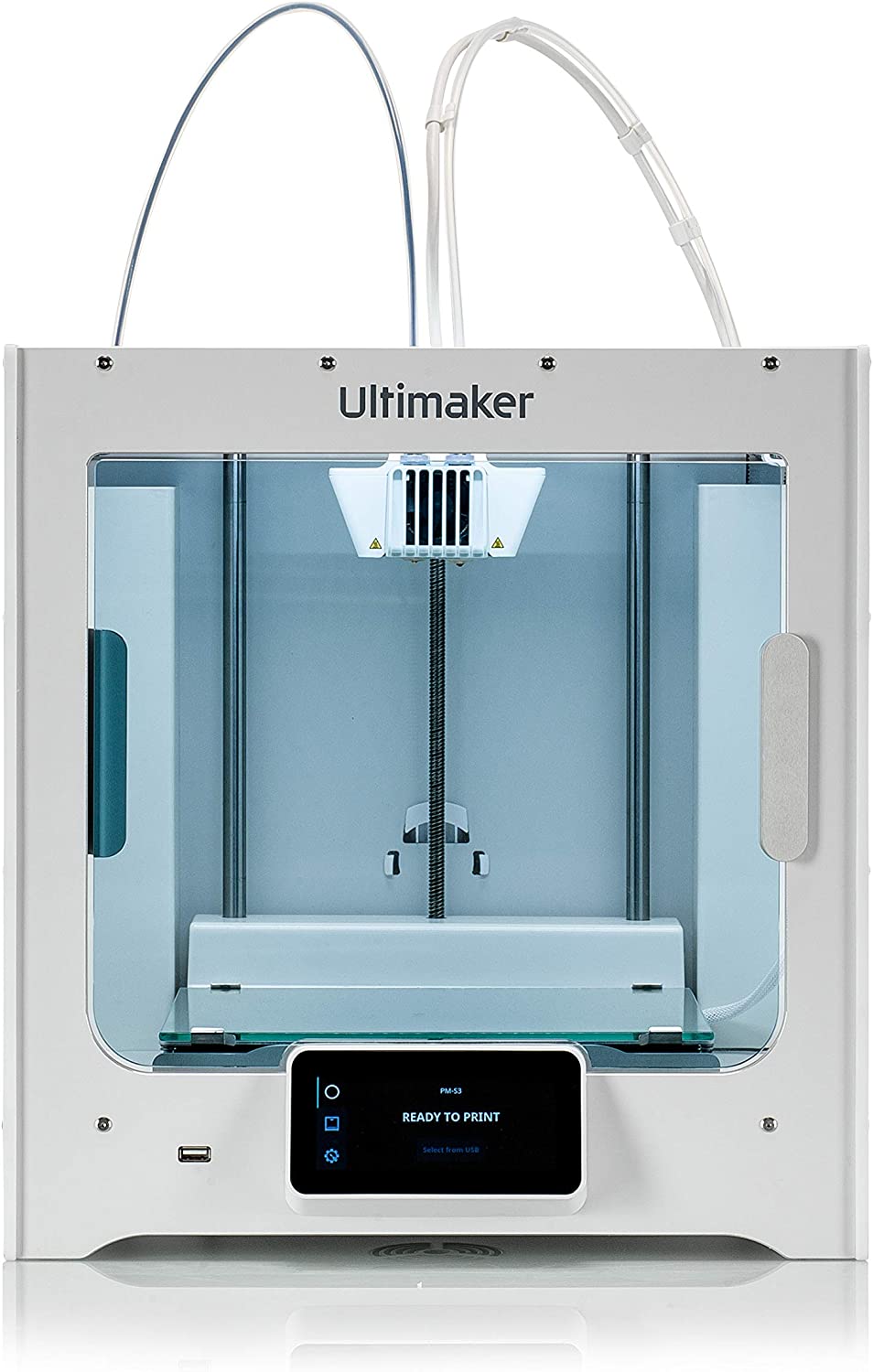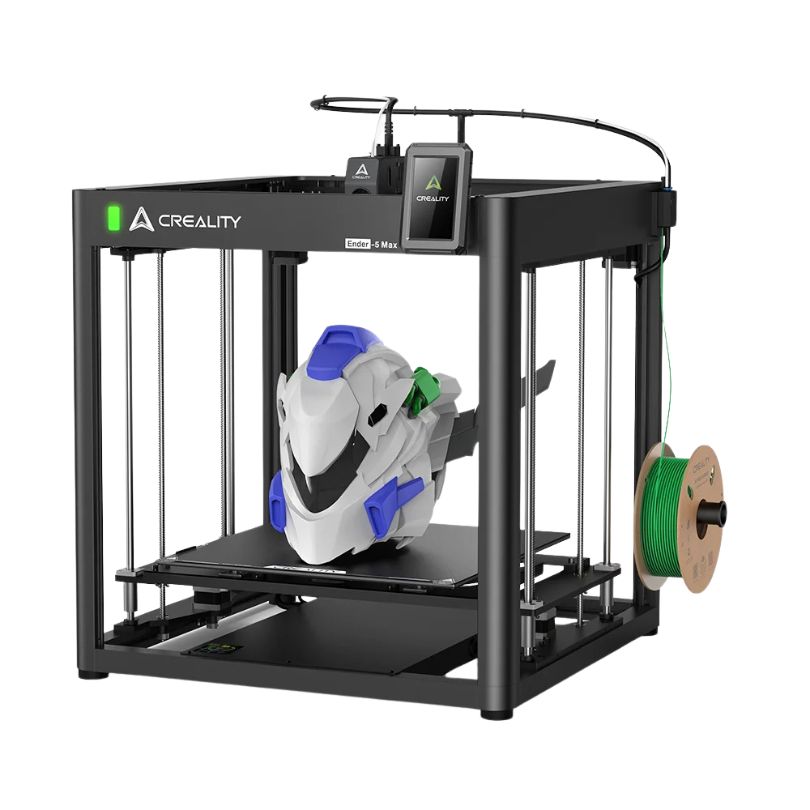Compare S5 vs Ender 5 Max
Comparison between the best 3D printers
Choose the best 3D printer at the best price. The cheapest 3D printers are here.
Buy a 3D printer here with 3D Fila.
 |
 |
|
| Model | S5 |
Ender 5 Max |
| Printing Material | Filament | Filament |
| Buy Filament for Ultimaker S5 | Buy Filament forCreality Ender 5 Max | |
| Estimated price | $6950,00 | $769,00 |
| Manufacturer | Ultimaker | Creality |
| Release Year | 2021 | 2025 |
| Print Volume [mm] | 330x340x300 | 400x400x400 |
| Printer Size [mm] | 495x585x780 | 649x721x850 |
| Weight [kg] | 20,6 | 25,9 |
| Power Loss Recovery | YES | YES |
| Enclosed printer | YES | NO |
| Bed Leveling | Automatic | Automatic |
| Filament End Sensor | YES | YES |
| Bed type | Heated | Heated |
| Power supply system | Bowden | Direct Drive |
| Standard nozzle | 0,4 | 0,4 |
| Maximum Nozzle Temperature [°C] | 280 | 300 |
| Maximum Bed Temperature [°C] | 140 | 100 |
| Maximum printing speed [mm/s] | 80 | 700 |
| Filament holder | YES | YES |
| Camera for supervision | YES | YES |
| Recommended filaments | PLA, ABS, PETG, PC, Nylon, Tritan | Hyper PLA/PLA/PETG/TPU95A/ABS/ASA/PLA-CF/PA/PLA-Silk |
| Recommended slicers | Cura | Creality Print 5.1 |
| Maximum Resolution [mm] | 0,1 | 0,1 |
| Processor | ||
| Display | Display touchscreen 4,7'' | Touchscreen 4,3'' |
| Power Supply | 110/220V / 500W | 1250 W |
| Connectivity | USB / Wi-Fi | USB, Wifi |
| Operating systems | Windows, Mac, Linux | Windows |
| Date of registration in the system | 2022-11-08 | 2025-02-18 |
| Release date | 2021 | 2025 |
| Extra features | The Ultimaker S5 stands out for its easy loading and unloading of materials, automatic bed leveling and excellent print quality with resolutions from 60 to 400 microns. It has dual extruders, interchangeable print cores, advanced connectivity with Wi-Fi and LAN, and intuitive software. It includes a Wi-Fi camera for monitoring, a removable glass bed, and a large build volume, making it ideal for professional and creative environments. | The Ender 5 Max by Creality features a 400 x 400 x 400 mm build volume, a rigid aluminum frame, and 36-point auto bed leveling. With speeds up to 700 mm/s, it boasts a hardened dual-gear extruder and a 1000W heated bed, reaching 80°C in just 200 seconds. It supports remote management via WLAN, a tri-color status indicator, and quiet operation, making it ideal for high-precision, high-productivity 3D printing. |
| Support for multiple colors and materials (AMS and CFS) | NO | NO |
Notes * |
||
| Cost-benefit | 2 / 10 | 7 / 10 |
| Hardware | 3.6 / 10 | 5 / 10 |
| Tela | . | . |
| Print volume | 4 / 10 | 4 / 10 |
| Performance | 1 / 10 | 6 / 10 |
Conclusion |
| In comparing the Ultimaker S5 and the Creality Ender 5 Max, it's clear that both 3D printers cater to different user needs, particularly when considering their price points and features. The Ultimaker S5, while significantly more expensive, is designed for professional environments that require high-quality prints and advanced functionalities. Its strengths lie in its dual extruder system, automatic bed leveling, and extensive material compatibility, making it well-suited for a variety of applications. Additionally, the enclosed design and comprehensive connectivity options enhance usability and reliability in precision-focused projects. On the other hand, the Creality Ender 5 Max offers an impressive volume and robust build capabilities at a much lower cost, making it a great option for hobbyists or small businesses looking to produce large prints quickly. Its high printing speed and user-friendly features, such as automatic bed leveling and heated bed, provide a balance between performance and affordability. However, it lacks some of the advanced features found in the S5, such as dual extruders and an enclosed printing area. In terms of overall cost-benefit, the Ender 5 Max scores higher, offering substantial performance and features for a fraction of the price of the S5. For users prioritizing professional quality and advanced capabilities, the Ultimaker S5 remains an excellent choice despite its higher investment. Conversely, those seeking a budget-friendly solution without sacrificing too much on quality and print size will find the Creality Ender 5 Max to be a compelling and effective option. Ultimately, the best choice depends on the specific needs, budget, and intended use of the printer. |

